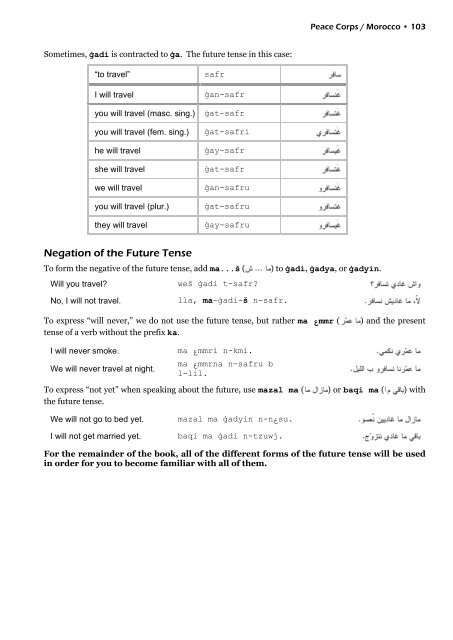Moroccan Arabic textbook 2011
Moroccan Arabic textbook 2011
Moroccan Arabic textbook 2011
You also want an ePaper? Increase the reach of your titles
YUMPU automatically turns print PDFs into web optimized ePapers that Google loves.
Peace Corps / Morocco • 103<br />
Sometimes, ġadi is contracted to ġa. The future tense in this case:<br />
“to travel”<br />
I will travel<br />
you will travel (masc. sing.)<br />
you will travel (fem. sing.)<br />
he will travel<br />
she will travel<br />
we will travel<br />
you will travel (plur.)<br />
they will travel<br />
safr<br />
ġan-safr<br />
ġat-safr<br />
ġat-safri<br />
ġay-safr<br />
ġat-safr<br />
ġan-safru<br />
ġat-safru<br />
ġay-safru<br />
Negation of the Future Tense<br />
To form the negative of the future tense, add ma...š (<br />
Will you travel<br />
weš ġadi t-safr<br />
) to ġadi, ġadya, or ġadyin.<br />
No, I will not travel.<br />
lla, ma-ġadi-š n-safr.<br />
To express ―will never,‖ we do not use the future tense, but rather ma mmrع (<br />
tense of a verb without the prefix ka.<br />
) and the present<br />
I will never smoke.<br />
We will never travel at night.<br />
ma mmriع n-kmi.<br />
ma mmrnaع n-safru b<br />
l-lil.<br />
To express ―not yet‖ when speaking about the future, use mazal ma ( ) or baqi ma ( ) with<br />
the future tense.<br />
We will not go to bed yet.<br />
I will not get married yet.<br />
mazal ma ġadyin n-nعsu.<br />
baqi ma ġadi n-tzuwj.<br />
For the remainder of the book, all of the different forms of the future tense will be used<br />
in order for you to become familiar with all of them.


